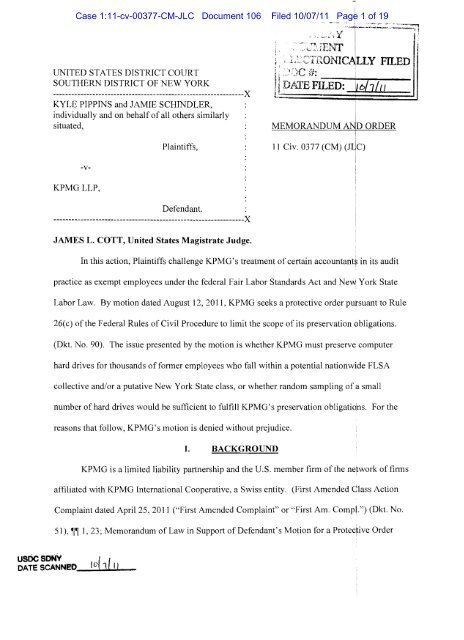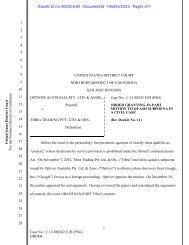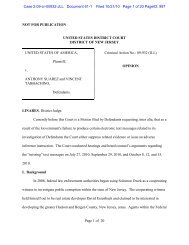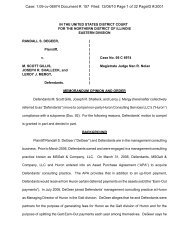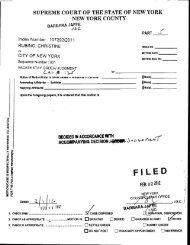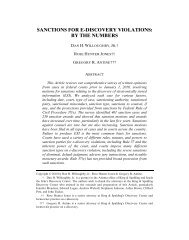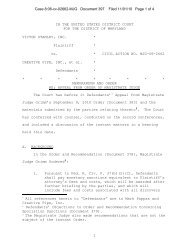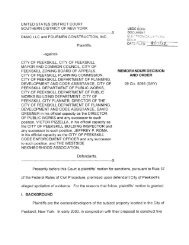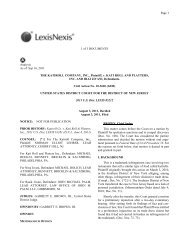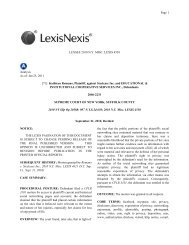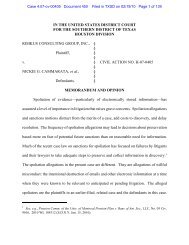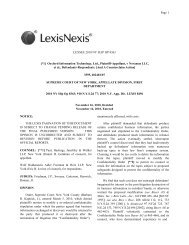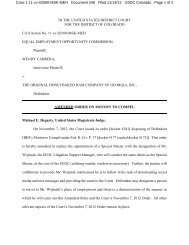Pippins v. KPMG, No. 11-377 - E-Discovery Law Alert
Pippins v. KPMG, No. 11-377 - E-Discovery Law Alert
Pippins v. KPMG, No. 11-377 - E-Discovery Law Alert
Create successful ePaper yourself
Turn your PDF publications into a flip-book with our unique Google optimized e-Paper software.
Case 1:<strong>11</strong>-cv-00<strong>377</strong>-CM-JLC Document 106 Filed 10/07/<strong>11</strong> Page 1 of 19<br />
UNITED STATES DISTRICT COURT <br />
SOUTHERN DISTRICT OF NEW YORK <br />
---------------------------------------------------------------)( <br />
KYLE PIPPINS and JAMIE SCHINDLER, <br />
individually and on behalf of all others similarly <br />
situated,<br />
Plaintiffs,<br />
t<br />
,; 'J<br />
y<br />
-L,,1<br />
MEMORANDUM A~D ORDER <br />
<strong>11</strong> Civ. 0<strong>377</strong> (CM) (J~C)<br />
i<br />
-v-<br />
<strong>KPMG</strong> LLP,<br />
Defendant.<br />
---------------------------------------------------------------)(<br />
JAMES L. COTT, United States Magistrate Judge.<br />
In this action, Plaintiffs challenge <strong>KPMG</strong>'s treatment of certain accountant~ in its audit<br />
practice as exempt employees under the federal Fair Labor Standards Act and New York State<br />
Labor <strong>Law</strong>. By motion dated August 12,20<strong>11</strong>, <strong>KPMG</strong> seeks a protective order pursuant to Rule<br />
26( c) of the Federal Rules of Civil Procedure to limit the scope of its preservation obligations.<br />
(Dkt. <strong>No</strong>. 90). The issue presented by the motion is whether <strong>KPMG</strong> must preserve computer<br />
hard drives for thousands of former employees who fall within a potential nationwide FLSA<br />
collective and/or a putative New York State class, or whether random sampling of a small<br />
number of hard drives would be sufficient to fulfill <strong>KPMG</strong>'s preservation obligatiqns. For the<br />
reasons that follow, <strong>KPMG</strong>'s motion is denied without prejudice.<br />
I. BACKGROUND<br />
<strong>KPMG</strong> is a limited liability partnership and the U.S. member firm of the network of firms<br />
affiliated with <strong>KPMG</strong> International Cooperative, a Swiss entity. (First Amended Class Action<br />
Complaint dated April 25,20<strong>11</strong> ("First Amended Complaint" or "First Am. CompV') (Dkt. <strong>No</strong>.<br />
51), ~~ 1,23; Memorandum of <strong>Law</strong> in Support of Defendant's Motion for a Protec~ive Order
Case 1:<strong>11</strong>-cv-00<strong>377</strong>-CM-JLC Document 106 Filed 10/07/<strong>11</strong> Page 2 of 19<br />
("Def.'s Mem.") (Dkt. <strong>No</strong>. 91), at 3; Answer to Collective Action Complaint dated April 4, 20<strong>11</strong><br />
(Dkt. <strong>No</strong>. 28), (' 1). <strong>KPMG</strong> provides audit, tax, and advisory services to clients throughout the<br />
United States, and its audit practice includes providing financial statement audits, integrated<br />
audits of financial statements, and internal control over financial reporting. (Def.' S Mem. at 3).<br />
Plaintiffs Kyle <strong>Pippins</strong> ("<strong>Pippins</strong>"), Jamie Schindler ("Schindler"), and Edward Lambert<br />
("Lambert") (collectively, "Plaintiffs") are former <strong>KPMG</strong> Audit Associates and Audit Associate<br />
Seconds (together, "Audit Associates"), who worked in the <strong>KPMG</strong> audit practice group. (First<br />
Am. CompI. ~ 2). The First Amended Complaint describes the Audit Associates a$ performing<br />
an "entry-level job that requires no advanced level training and primarily involves performance<br />
of routine duties," which are closely supervised by more senior <strong>KPMG</strong> employees. (Id. ~(' 2-3).<br />
Plaintiffs allege that <strong>KPMG</strong> willfully miscIassified Audit Associates as exempt<br />
employees under the Fair Labor Standards Act ("FLSA"), 29 U.S.C. §§ 201 et seq., causing them<br />
to be deprived of overtime wages for time they worked in excess of 40 hours per week. (ld.<br />
(' 59). Plaintiffs further allege that <strong>KPMG</strong> failed to keep accurate records of the time Audit<br />
Associates worked. (Id.). Plaintiffs assert that this conduct constitutes a "pattern or practice of<br />
violating wage and hour laws," including the FLSA and New York State Labor <strong>Law</strong>. (Id. ~~ 5<br />
6).<br />
On January 19, 20<strong>11</strong>, <strong>Pippins</strong> and Schindler filed this action pursuant to the collective<br />
action provision of the FLSA, 29 U.S.C. § 216(b), on behalf of themselves and all similarly<br />
situated persons who worked as Audit Associates for <strong>KPMG</strong>, whom <strong>KPMG</strong> classified as<br />
exempt, and who elect to opt-in to the action. (Collective Action Complaint dated January 19,<br />
2
Case 1:<strong>11</strong>-cv-00<strong>377</strong>-CM-JLC Document 106 Filed 10/07/<strong>11</strong> Page 3 of 19<br />
20<strong>11</strong> (Dkt. <strong>No</strong>. 1).- 6). Three additional plaintiffs-including Lambert-later filed opt-in<br />
notices in the action. (Dkt. <strong>No</strong>s. 10, <strong>11</strong>, 50).<br />
On March 9, 201 1, prior to joining this action, Lambert filed a separate putative class<br />
action, Lambert v. <strong>KPMG</strong> LLP, <strong>No</strong>. <strong>11</strong> Civ. 1622 (CM) (S.D.N.Y.), under Federal Rule of Civil<br />
Procedure 23 on behalf of current and former Audit Associates working for <strong>KPMG</strong> in New<br />
York, asserting claims under New York Labor <strong>Law</strong> Article 19, §§ 650<br />
~, and the supporting<br />
New York State Department of Labor regulations (collectively, the "NYLL"). On April 25,<br />
20<strong>11</strong>, Plaintiffs filed the First Amended Complaint, which added Lambert as a named plaintiff<br />
and incorporated the NYLL claims raised in Lambert's separate action. (First Am. CampI.<br />
.-.- 44-53). As a result, Judge McMahon dismissed Lambert's separate action without prejudice<br />
by a Stipulation and Order dated May 10,20<strong>11</strong>. (Dkt. <strong>No</strong>. 56).<br />
Pursuant to the First Amended Complaint, the FLSA collective includes opt-in plaintiffs<br />
who worked as Audit Associates in any of <strong>KPMG</strong>'s U.S. offices between January 19,2008 and<br />
January 19,20<strong>11</strong> (First Am. Compi. t' 42), and the putative New York class includes all Audit<br />
Associates who worked for <strong>KPMG</strong> in New York from March 8, 2005 until the date of final<br />
judgment. (Id. ~ 44).<br />
In a Decision and Order dated March 21, 20<strong>11</strong>, Judge McMahon denied <strong>KPMG</strong>'s<br />
Motions to Transfer and Stay the Action. (Okt. <strong>No</strong>. 23). Plaintiffs' Motion for Conditional<br />
Certification and Court-Authorized <strong>No</strong>tice Pursuant to Section 216(b) ofthe FLSA ("Motion to<br />
Certify") (Okt. <strong>No</strong>. 33) is sub<br />
By Order dated May 23, 20<strong>11</strong>, Judge McMahon referred<br />
the issue presented by <strong>KPMG</strong>'s pending motion to me. (Okt. <strong>No</strong>. 65). By endorsement dated<br />
3
Case 1:<strong>11</strong>-cv-00<strong>377</strong>-CM-JLC Document 106 Filed 10/07/<strong>11</strong> Page 4 of 19<br />
June 27, 20<strong>11</strong>, Judge McMahon ordered that discovery was stayed pending resolution of the<br />
Motion to Certify. (Dkt. \Io. 79).<br />
II.<br />
THE PRESENT MOTION<br />
Although Judge McMahon has stayed discovery pending resolution of the Motion to<br />
Certify, <strong>KPMG</strong> seeks clarification from this Court concerning its obligation to preserve certain<br />
electronically stored information ("ESr'), specifically the hard drives from former and departing<br />
Audit Associates' laptop computers. Plaintiffs anticipate that these hard drives will contain<br />
"such data as the usage information, log-inllog-out information, application records, forms, and<br />
other contents stored on the laptops in the course ofthe business day, which would be helpful in<br />
showing both the range of hours during which they worked and the substance of their work."<br />
(Plaintiffs' Memorandum of <strong>Law</strong> In Opposition to Defendant's Motion for Protective Order<br />
("PIs.' Mem.") (Dkt. <strong>No</strong>. 96), at 3). However, Plaintiffs acknowledge that the exact contents of<br />
the hard drives are unknown. (ld. at 12).<br />
After extensive negotiations between the parties and several mediation efforts by the<br />
Court failed to resolve the dispute over <strong>KPMG</strong>'s duty to preserve these hard drives during the<br />
pendency of the litigation, <strong>KPMG</strong> has now moved for a protective order that would limit the<br />
scope of its preservation obligations. In particular, <strong>KPMG</strong> seeks an order that would require it to<br />
preserve only a random sample of 100 hard drives from among those hard drives of former Audit<br />
Associates that it has already preserved in the course of this and other litigations, against which<br />
the parties could then apply keyword searches using terms proposed by Plaintiffs. (Def.' s Mem.<br />
at 1-2). These searches, <strong>KPMG</strong> claims, would isolate a "universe of documents" that <strong>KPMG</strong><br />
would preserve without the level of expense required by more widespread preservation efforts.<br />
4
Case 1:<strong>11</strong>-cv-00<strong>377</strong>-CM-JLC Document 106 Filed 10/07/<strong>11</strong> Page 5 of 19<br />
(Id. at 1). Alternatively, <strong>KPMG</strong> seeks an order compelling Plaintiffs to bear the costs of<br />
preserving the hard drives beyond the scope of preservation <strong>KPMG</strong> has suggested. (ld. at 2-3,<br />
14-15).<br />
<strong>KPMG</strong>'s primary argument in support of its motion is that the burden of preserving the<br />
hard drives of all former and departing <strong>KPMG</strong> Audit Associates is disproportionate to the<br />
potential benefit. <strong>KPMG</strong> claims that, given the possibility of preserving a sample of hard drives<br />
or a smaller "universe of documents," it is unnecessary and unreasonable for <strong>KPMG</strong> to incur the<br />
expense of continuing to preserve the hard drives already in its possession and then preserving<br />
any additional hard drives that it might accumulate as Audit Associates-potential members of<br />
the FLSA collective and putative New York class members-leave <strong>KPMG</strong>. at 1-2).<br />
According to <strong>KPMG</strong>, there are more than 7,500 potential opt-in plaintiffs to the FLSA collective<br />
nationwide and more than 1,500 putative class members in New York. (Declaration of Thomas<br />
Keegan dated August 1 20<strong>11</strong> ("Keegan Decl.") (Dkt. <strong>No</strong>. 92), ~ 6). It estimates that the cost to<br />
preserve each hard drive is approximately $600. (Id. ~l~<br />
<strong>11</strong>-12). Because <strong>KPMG</strong> has already<br />
preserved more than 2,500 hard drives of Audit Associates-including 500 former Audit<br />
Associates who are members of the putative class in New York and nearly 2,300 former Audit<br />
Associates who are potential members of the FLSA collective-it claims to have already<br />
incurred more than $1,500,000 in hard-drive preservation. ~~i 8-9, 12). In its motion and at a<br />
pre-motion conference before this Court, <strong>KPMG</strong> raised concerns about additional long-term<br />
costs of ongoing preservation, beyond the $600 cost to preserve a single hard drive, including the<br />
costs that may be incurred if these hard drives remain available and subject to discovery in other<br />
litigation. (See Transcript of June 16,20<strong>11</strong> Conference ("June 16 Tr.") (Okt. <strong>No</strong>. 83), at 12).<br />
5
Case 1:<strong>11</strong>-cv-00<strong>377</strong>-CM-JLC Document 106 Filed 10/07/<strong>11</strong> Page 6 of 19<br />
These costs would, <strong>KPMG</strong> argues, "swallow the amount at stake" in the litigation. (Def.'s Mem.<br />
at 2).<br />
Plaintiffs respond that they arc not averse to using sampling as a means to preserve a<br />
more limited number of hard drives at a lower cost. (Pis.' Mem. at 1). However, the parties<br />
have repeatedly disagreed on the methodology by which a meaningful sample could be obtained.<br />
(See Def.'s Mem. at 2). PlaintifTs raise three objections in response to <strong>KPMG</strong>'s proposal that the<br />
parties use keyword searches to create a sample of documents for preservation. First, they argue<br />
that any action that will result in the destruction of hard drives is premature because there has<br />
been insufficient discovery to enable the parties and the Court "to knowledgably craft a plan for<br />
preservation and production." (Pis.' Mem. at 12). Plaintiffs have indicated that it would be<br />
difficult, if not impossible, to generate search terms without the opportunity to first determine<br />
what the hard drives contain. (lll). Second, Plaintiffs argue that using keyword searches is an<br />
"outmoded method of data recovery" that does not ref1ect context or capture all relevant<br />
materials. (ld. at 15-16). Finally, Plaintiffs believe that the information they seek, which may<br />
demonstrate the Audit Associates' work product and hours worked, would not be culled using<br />
keyword searches. (Id. at 16).<br />
Likewise, Plaintiffs have suggested that any meaningful sample of documents or hard<br />
drives could not be obtained by searching an entirely random selection of hard drives because the<br />
sample would need to account for possible differences among potential members of the FLSA<br />
collective and the putative class in New York given <strong>KPMG</strong>'s argument that Plaintiffs are not<br />
representative of either group. (June 16 Tr. at 6). These differences include the geography or<br />
office locations of the Audit Associates; the client industries for which the Audit Associates<br />
6
Case 1:<strong>11</strong>-cv-00<strong>377</strong>-CM-JLC Document 106 Filed 10/07/<strong>11</strong> Page 7 of 19<br />
provided services; the seniority or tenure of the Audit Associates; and the time period of the<br />
Audit Associates' employment to account for changing economic circumstances. ~ at 6-<strong>11</strong>).<br />
On that point, <strong>KPMG</strong> claims there is a tension between Plaintiffs' asserting that their own<br />
individual claims are representative of a proposed nationwide FLSA collective and putative New<br />
York class while also requesting that <strong>KPMG</strong> preserve the eomputer hard drives of all, or many,<br />
of<strong>KPMG</strong>'s former and departing Audit Associates. (Def.'s Mem. at 1-2). In response, Plaintiffs<br />
concede that because they propose to litigate this case on a representative basis, if their Motion<br />
to Certify is granted, it would be "unnecessary for <strong>KPMG</strong> to preserve indefinitely the hard drive<br />
of every departing Audit Associate," although they question whether <strong>KPMG</strong>'s proposal that it<br />
preserve 100 samples would be sufficient. (Pis.' Mem. at 18 & nA).<br />
Separately, Plaintiffs contest <strong>KPMG</strong>'s arguments that continuing its preservation efforts<br />
has caused the company an undue burden that is disproportionate to the potential relevance of the<br />
materials contained on the hard drives. (Id. at 12, 14-15). In particular, Plaintiffs have pointed<br />
to their inability to cross-examine <strong>KPMG</strong>'s assessments of the cost of ongoing preservation (Id.<br />
at 12), such as the S600 figure, and <strong>KPMG</strong>'s assertions that the purported costs are solely<br />
attributable to this litigation rather than to separate preservation demands required by state and<br />
federal regulations or industry practices, or litigation holds in other lawsuits. (ld. at 9-10, 1<br />
Finally, Plaintiffs seek an order directing <strong>KPMG</strong> to (l) provide Plaintiffs with five hard<br />
drives for inspection that, Plaintiffs argue, would enable the parties to negotiate a possible<br />
sample, and (2) preserve the hard drives of all departing Audit Associates until the parties can<br />
I In reply, <strong>KPMG</strong> contends that these "back out" expenses are not determinative ofthe potential expenses <strong>KPMG</strong><br />
will incur to preserve hard drives for this lawsuit, because those independent preservation obligations could be lifted<br />
in the future. (Reply Memorandum of <strong>Law</strong> in Further Support of Defendant's Motion for a Protective Order dated<br />
September 2, 20<strong>11</strong> ("Der's Reply Mem.") (Dkt. <strong>No</strong>. 100), at 6 n.4).<br />
7
Case 1:<strong>11</strong>-cv-00<strong>377</strong>-CM-JLC Document 106 Filed 10/07/<strong>11</strong> Page 8 of 19<br />
agree to a methodology to obtain an appropriate sample. (ld. at 18). Plaintiffs further request<br />
that the Court give "the parties guidance about how to proceed." (ld.).<br />
III.<br />
DISCUSSION<br />
A. Legal Standards Governing Protective Orders and Preservation<br />
Federal Rule of Civil Procedure 26(c) authorizes a federal court to issue a protective<br />
order "for good cause ... to protect a party or person from annoyance, embarrassment,<br />
oppression, or undue burden or expense."<br />
S.E.C. v. Rajaratnam, 622 F.3d 159; 181 (2d Cir.<br />
2010) (enumerating the measures that a district court may take to protect legitimate interests in<br />
course of discovery). The party seeking a protective order pursuant to Rule 26(c) bears the<br />
burden to establish the existence of good cause necessitating the order. See Gambale v.<br />
Deutsche Bank AG, <strong>377</strong> F.3d 133, 142 (2d Cir. 2004) (citing In re Agent Orange Prod. Liab.<br />
Litig., 821 F.2d 139, 145 (2d Cir. 1987)). Good cause exists when a party seeking the protective<br />
order can articulate'" a clearly defined, specific and serious injury'" that will result in the<br />
absence of the order. In re Terrorist Attacks on September 1 L 2001,454 F. Supp. 2d 220,222<br />
(S.D.N.Y. 2006) (quoting Shingara v. Skiles, 420 F.3d 301,306 (3d CiT. 2005)); =-===<br />
Parmalat Sees. Litig., 258 F.R.D. 236,244 (S.D.N. Y. 2009) ("broad allegations ofhann<br />
unsubstantiated by specifie examples or articulated reasoning fail to satisfy the test") (eitations<br />
omitted). Although the party seeking the protective order bears the burden ofestablishing good<br />
cause, the court must weigh the interests of both parties in considering the necessity and scope of<br />
the order. See Mitchell v. Fishbein, 227 F.R.D. 239, 245 (S.D.N.Y. 2005) ("'[U]nder Rule 26(c),<br />
the appropriateness of protective relief from discovery depends upon a balancing of the litigation<br />
needs of the discovering party and any countervailing protectable interests of the party from<br />
8
Case 1:<strong>11</strong>-cv-00<strong>377</strong>-CM-JLC Document 106 Filed 10/07/<strong>11</strong> Page 9 of 19<br />
whom discovery is sought."') (quoting Apex Oil Co. v. DiMauro, <strong>11</strong>0 F.R.D. 490, 496 (S.D.N.Y.<br />
1985)).<br />
<strong>KPMG</strong>'s motion thus requires the Court to balance the company's interest in avoiding<br />
"annoyance, embarrassment, oppression, or undue burden or expense" that would result from its<br />
obligation to preserve the hard drives with its duty to preserve, which is rooted in the concern<br />
that once potentially relevant materials on the hard drives have been disposed of, their contents<br />
will forever be gone.<br />
The duty to preserve has been described as follows:<br />
[A]nyone who anticipates being a party or is a party to a lawsuit must not destroy unique,<br />
relevant evidence that might be useful to an adversary. While a litigant is under no duty<br />
to keep or retain every document in its possession ... it is under a duty to preserve what<br />
it knows, or reasonably should know, is relevant in the action, is reasonably calculated to<br />
lead to the discovery of admissible evidence, is reasonably likely to be requested during<br />
discovery and/or is the subject of a pending discovery request.<br />
Zubulake v. UBS Warburg LLC, 220 F.R.D. 212, 217 (S.D.N.Y. 2003) ("Zubulake IV")<br />
(footnotes, internal quotation marks, and citations omitted). In the context of discovery,<br />
relevance "is to be interpreted broadly" and includes '" any matter that bears on, or that ...<br />
reasonably could lead to other [information] that could bear on, any issue that is or may be in the<br />
case. '" In re Flag Telecom Holdings, Ltd. Secs. Litig., 236 F.R.D. 177, 183 (S.D.N.Y. 2006)<br />
(quoting Sherwin-Williams Co. v. Spitzer, <strong>No</strong>. 04 Civ. 185 (DNH), 2005 WL 2128938, at *<strong>11</strong><br />
(N.D.N.Y. Aug. 24,2005) (quoting Oppenheimer Fund, Inc. v. Sanders, 437 U.S. 340, 351<br />
(1978))). The scope of this preservation duty extends to the "key players" in a lawsuit, meaning<br />
"individuals 'likely to have discoverable information that the disclosing party may use to support<br />
its claims or defenses.'" Zubulake IV, 220 F.R.D. at 218 (quoting Fed. R. Civ. P. 26(a)(l )(A)).<br />
The duty is also prospective, requiring "[a] party or anticipated party [to] retain all relevant<br />
9
Case 1:<strong>11</strong>-cv-00<strong>377</strong>-CM-JLC Document 106 Filed 10/07/<strong>11</strong> Page 10 of 19<br />
documents (but not multiple identical copies) in existence at the time the duty to preserve<br />
attaches, and any relevant documents created thereafter." Id.<br />
<strong>KPMG</strong> seeks to reconcile its duty to preserve discovery material with the burden of that<br />
preservation by advocating a proportionality test. (DeC's Mem. at 6-8 (citing Zubulake IV;<br />
Victor Stanlev, Inc. v. Creative Pipe, Inc., 269 F.R.D. 497, 522-23 (D. Md. 201 0); Rimkus<br />
Consulting Group, Inc. v. Cammarata, 688 F. Supp. 2d 598, 613 (S.D. Tex. 2010))). This test, in<br />
effect, blends the protections afforded by Rule 26(b )(2), "which permits the court to limit<br />
discovery if the burden or expense of production outweighs its potential benefits," and Rule<br />
26(c), "which permits the issuance of protective orders, including by shifting the costs of unduly<br />
burdensome or expensive production." Quinbv v. WestLB AG, 245 F.R.D. 94, 106 (S.D.N. Y.<br />
2006), amended on other grounds, 2007 WL 38230 (S.D.N.Y. Jan. 4, 2007).<br />
However, courts have recognized that in the context of preservation, "this<br />
[proportionality1standard may prove too amorphous to provide much comfort to a party deciding<br />
what files it may delete or backup tapes it may recycle." Orbit One Commc'ns, Inc. v. Numerex<br />
Corp., 271 F.R.D. 429, 436 (S.D.N.Y. 2010) (considering numerous preservation failures in the<br />
context of sanctions). Accordingly, "[1.1Jntil a more precise definition is created by rule,"<br />
prudence favors retaining all relevant materials. rd. (citing Zubulake IV, 220 F.R.D. at 218).<br />
B. <strong>KPMG</strong>'s Obligations<br />
To determine the scope of <strong>KPMG</strong>'s preservation obligations, the Court first must<br />
determine whether the material Plaintiffs seek to have preserved is indeed relevant. PlaintitTs<br />
will ultimately bear the burden of establishing their job duties, which will determine whether<br />
they were exempt from overtime payments under the FLSA, and the hours they worked, for<br />
10
Case 1:<strong>11</strong>-cv-00<strong>377</strong>-CM-JLC Document 106 Filed 10/07/<strong>11</strong> Page <strong>11</strong> of 19<br />
which they claim they were underpaid. Accordingly, any material contained on the hard drives<br />
that tends to show either the Audit Associates' job responsibilities or the hours they worked is<br />
relevant. (Pis.' Mem. at 13-14). Plaintiffs go so far as to suggest that because each and every<br />
Audit Associate who may opt-in to the FLSA collective or who is a member of the putative New<br />
York class may have to prove his or her damages, <strong>KPMG</strong> must maintain the hard drive of each<br />
and every Audit Associate. (Id. at 14).<br />
In response, <strong>KPMG</strong> relies less on establishing that the material on the hard drives is<br />
irrelevant and more on demonstrating the availability of alternative sourees of infonnation that<br />
may be more authoritative than the materials eontained on the hard drives in proving the disputed<br />
factual issues. (Def.' s Mem. at 8-10). However, at this point it is not entirely clear what the hard<br />
drives contain, in part because of<strong>KPMG</strong>'s own efforts to keep that information at bay. Given<br />
the absence of that crucial information and because "relevance" in the context of discovery is "an<br />
extremely broad concept," Condit v. Dunne, 225 F.R.D. 100, 105 (S.D.N.Y. 2004), Defendants<br />
have failed to establish that the contents of the disputed hard drives are not relevant.<br />
The Court must next determine whether the material to be preserved was created by or<br />
for "key players" in the litigation, meaning those who are "likely to have relevant infonnation."<br />
Zubulake IV, 220 F.R.D. at 217-18; =~= Zubulake v. UBS Warburg LLC, 229 F.R.D. 422,<br />
433-34 (S.D.N.Y. 2004) ("Zubulake V") (key players include "the people identified in a party's<br />
initial disclosure and any subsequent supplementation thereto"); Goodman v. Praxair Servs., Inc.,<br />
632 F. Supp. 2d 494, 512 (D. Md. 2009) ("[I]dentifying a 'key player' in litigation is not<br />
dependent on the volume of interaction between an individual and a litigant, but rather is<br />
detennined by whether an individual is likely to have information relevant to the events that<br />
<strong>11</strong>
Case 1:<strong>11</strong>-cv-00<strong>377</strong>-CM-JLC Document 106 Filed 10/07/<strong>11</strong> Page 12 of 19<br />
underlie the litigation."). Despite <strong>KPMG</strong>'s claims that former and departing Audit Associates<br />
are not "key players" in this litigation (Def.' s Mem. at 10-<strong>11</strong>), until the pending Motion to<br />
Certify is resolved, each and every Audit Associate whom the company deemed was exempt<br />
from overtime payments under the FLSA is a potential plaintitI and thus could be found to be a<br />
"key player."<br />
Additionally, assuming arguendo that Judge McMahon were to deny the Motion to<br />
Certify, <strong>KPMG</strong>'s duty to preserve the hard drives containing information created by or for these<br />
Audit Associates would fall within the class of discovery materials that <strong>KPMG</strong> is obligated to<br />
preserve because the company is on notice that the hard drives may contain discovery material<br />
relevant to potential "future litigation" brought by these Audit Associates.<br />
Orbit One<br />
Commc'ns, Inc., 271 F.R.D. at 436 (quoting Kronisch v. United States, 150 F.3d <strong>11</strong>2, 126 (2d<br />
Cir. 1998) (noting that the duty to preserve may attach even before a lawsuit is commenced),<br />
overruled on other grounds, =-"'==-:~~=, 528 U.S. 549 (2000)). Accordingly, although the<br />
Court does not reach whether all potential members of the FLSA collective and all members of<br />
the putative New York class will be key players if the Motion to Certify is granted, these Audit<br />
Associates are, at the very least, key players in anyone ofmany potential actions that could<br />
result if the Motion to Certify is denied. As such, <strong>KPMG</strong> has failed to establish that the hard<br />
drives do not relate to "key players" in the litigation.<br />
Finally, the Court must consider whether the ongoing preservation of hard drives would<br />
be duplicative of other discovery materials subject to <strong>KPMG</strong>'s separate preservation efforts. See<br />
==="--,,,-,,-,220 F.R.D. at 218 (although corporate parties must preserve all relevant documents<br />
in existence at the time the duty to preserve attaches as well as any relevant documents created<br />
12
Case 1:<strong>11</strong>-cv-00<strong>377</strong>-CM-JLC Document 106 Filed 10/07/<strong>11</strong> Page 13 of 19<br />
thereafter, they need not preserve "multiple identical copies" of relevant discovery materials).<br />
<strong>KPMG</strong> has not argued explicitly that the materials contained on the hard drives are duplicative of<br />
other materials it has already preserved. Rather, it has enumerated various categories of<br />
discovery materials that it deems more likely to resolve the factual matters in dispute, and which,<br />
the company claims, include materials already subject to ongoing preservation. To that end,<br />
<strong>KPMG</strong> notes that it has undertaken "broad efforts to preserve ESI and other relevant documents"<br />
that would tend to show the job duties and hours of Audit Associates, including "Human<br />
Resources records describing their job duties and job titles, recruiting documents and job<br />
postings, performance reviews, training materials describing general and specific job<br />
responsibilities and standards for professional conduct and performance, time records showing<br />
their hours recorded, and payroll records showing their compensation." (Oef.'s Mem. at 4).<br />
Additionally, <strong>KPMG</strong> refers to its obligations under "professional standards and federal<br />
regulations that require the retention of certain documentation, including electronic records,<br />
related to an audit or review for at least seven years after its conclusion," which would preserve<br />
additional discovery material reflecting Audit Associates' job responsibilities and hours. (ld. at<br />
<strong>11</strong>). Finally, <strong>KPMG</strong> suggests that "[t]he best source of information regarding the job<br />
responsibilities of, and work actually performed by," Audit Associates is the testimony of the<br />
Audit Associates and their supervisors. (Id. at 8).<br />
While <strong>KPMG</strong>'s preservation efforts appear to have been comprehensive and, at a later<br />
point in the litigation, the parties and the Court will have to resolve what evidence is most<br />
authoritative as to the factual issues in dispute, the documents and other potential discovery<br />
materials that <strong>KPMG</strong> possesses do not appear to be duplicative of the material that Plaintiffs<br />
13
Case 1:<strong>11</strong>-cv-00<strong>377</strong>-CM-JLC Document 106 Filed 10/07/<strong>11</strong> Page 14 of 19<br />
anticipate will be on the hard drives. (PIs.' Mem. at 3). For example, because the hard drives<br />
contain the contents of Audit Associates' individual laptops, they may contain materials that<br />
would not otherwise be preserved by <strong>KPMG</strong> as the company has described the scope of its<br />
current preservation, such as drafts, personal notations or memoranda, or correspondence among<br />
Audit Associates and other <strong>KPMG</strong> employees. In other words, the hard drives may reflect the<br />
types of unofficial work materials that would supplement the official company materials <strong>KPMG</strong><br />
already has preserved, and which might well favor the company. In sum, <strong>KPMG</strong> has not<br />
demonstrated that the materials it seeks to dispose of are duplicative of materials that are already<br />
subject to its preservation etTorts. Accordingly, <strong>KPMG</strong> has not established the absence of a duty<br />
to preserve the hard drives.<br />
C. Proportionality<br />
As noted, courts in this district have cautioned against the application of a proportionality<br />
test as it relates to preservation. See, e.g., Orbit One Commc'ns.Inc., 271 F.R.D. at 436 n.10<br />
("Proportionality is particularly tricky in the context ofpreservation. It seems unlikely, for<br />
example, that a court would excuse the destruction of evidence merely because the monetary<br />
value of anticipated litigation was low. "). At this point in the litigation, it is unclear whether an<br />
application of a proportionality test would weigh in favor of a protective order. Certainly<br />
<strong>KPMG</strong>'s preservation of the hard drives is not without considerable expense. (See Keegan Decl.<br />
at '1'1 6-12). However, <strong>KPMG</strong> has not been able to establish conclusively that the materials<br />
contained on the hard drives are of either "little value" or "not unique." (Def.'s Mem. at 7<br />
(citing The Sedona Conference, The Sedona Conference Commentarv on Proportionality in<br />
Electronic Discoverv, <strong>11</strong> Sedona Cont'. J. 289,291 (2010) (Principle <strong>No</strong>.1)). Until discovery<br />
14
Case 1:<strong>11</strong>-cv-00<strong>377</strong>-CM-JLC Document 106 Filed 10/07/<strong>11</strong> Page 15 of 19<br />
proceeds and the parties can resolve what materials are contained on the hard drives and whether<br />
those materials are responsive to Plaintiffs' document requests, it would be premature to permit<br />
the destruction of any hard drives. Moreover, the parties should be able to make such a<br />
determination promptly once the Motion to Certify is resolved and the stay of discovery is lifted.<br />
Because it is not possible to predict when that determination will be made, it is similarly difficult<br />
to conclude what <strong>KPMG</strong>'s costs of preservation will be on an ongoing basis. With so many<br />
unknowns involved at this stage in the litigation, permitting <strong>KPMG</strong> to destroy the hard drives is<br />
simply not appropriate at this time.<br />
It bears noting that this is a dispute about preservation, not production. Although<br />
"[p Jrotective orders can take a variety of forms in order to fit the circumstances of the case,"<br />
Standard Investment Chartered, Inc. v. National Association of Securities Dealers, Inc., <strong>No</strong>. 07<br />
Civ. 2014 (SWK), 2008 WL 199537, at *2 (S.D.N.Y. Jan. 22, 2008) (citation omitted), the more<br />
common circumstances giving rise to a protective order involve parties seeking to limit the<br />
dissemination of otherwise private material and, in effect, preserve the integrity of that material<br />
as, for example, privileged or confidential. See, e.g., Duling v. Gristede's Operating Corp., 266<br />
F.R.D. 66, 74 (S.D.N.Y. 2010) (defendants sought order limiting plaintiff employees' use of<br />
employment records produced in discovery, including materials that tended to "implicate privacy<br />
concerns and have the potential to embarrass the subject employee if revealed"). Directing<br />
<strong>KPMG</strong> to continue its preservation in this case maintains the integrity of the materials contained<br />
on the hard drives by preventing their destruction. Given the finality that would result from<br />
granting <strong>KPMG</strong>'s motion and what stands to be lost-especially as compared to the potential (if<br />
not likelihood) that the ongoing preservation can (and will) be limited through sampling once the<br />
15
Case 1:<strong>11</strong>-cv-00<strong>377</strong>-CM-JLC Document 106 Filed 10/07/<strong>11</strong> Page 16 of 19<br />
Motion to Certify is resolved and discovery proceeds-it is not unreasonable that <strong>KPMG</strong><br />
continue its preservation at this time.<br />
Additionally, <strong>KPMG</strong>'s ongoing burden is self-inflicted to a large extent. It is suffering<br />
from the effects of its own reluctance to work with Plaintiffs to generate a reasonable sample that<br />
may well be less burdensome to maintain. (See Def.'s Mem. at 12 (citations omitted)). <strong>KPMG</strong><br />
is correct that "[t]he concept of sampling to test both the cost and the yield is now part of the<br />
mainstream approach to electronic discovery." S.E.C. v. Collins & Aikman Corp., 256 F.R.D.<br />
403,418 (S.D.N.Y. 2009) (citing Zubulake I, 217 F.R.D. at 322); see also ~~~~, 229<br />
F.R.D. at 432 CIt may be possible to run a system-wide keyword search; counsel could then<br />
preserve a copy of each 'hit.'... When the opposing party propounds its document requests, the<br />
parties could negotiate a list of search terms to be used in identifying responsive documents, and<br />
counsel would only be obliged to review documents that came up as 'hits' on the second, more<br />
restrictive search.") (footnotes omitted). However, to date, <strong>KPMG</strong> has failed to work effectively<br />
with Plaintiffs in order to generate a potential means of construeting an appropriate sample.<br />
Despite <strong>KPMG</strong>'s contention that Plaintiffs have "refus[ed] to even consider the application of<br />
search terms" as a means of producing a meaningful sample (Def.'s Mem. at 12), the record<br />
suggests that <strong>KPMG</strong> did not provide PlaintitTs with the opportunity to learn of the hard drive's<br />
contents-such as by reviewing a handful of hard drives that counsel had vetted for privilege or<br />
created a log of contents-that might have enabled them to "propound targeted requests for<br />
specific files contained within the hard drivcs at lesser cost." (PIs.' :V1em. at 12). While the<br />
Court will not direct KP:v1G to provide PlaintifTs with five hard drivcs for inspection, it<br />
encourages the parties to continue to meet and confer in light of this decision to see if an<br />
16
Case 1:<strong>11</strong>-cv-00<strong>377</strong>-CM-JLC Document 106 Filed 10/07/<strong>11</strong> Page 17 of 19<br />
agreement on sampling can be reached, sooner rather than later, thus alleviating the cost<br />
concerns <strong>KPMG</strong> has raised in its motion.<br />
D. Cost-Shifting<br />
In the context of discovery, there is a presumption "that the responding party must bear<br />
the expense of complying with discovery requests, but he may invoke the district court's<br />
discretion ... to grant orders protecting him from 'undue burden or expense ....",<br />
Oppenheimer Fund, Inc., 437 U.S. at 358 (citing Fed. R. Civ. P. 26(c»; see Quinby, 245 F.R.D.<br />
at 101-02 (same). A district court may therefore issue an order under Rule 26(c) that protects the<br />
responding party from undue burden or expense by "conditioning discovery on the requesting<br />
party's payment of the costs of discovery." Oppenheimer Fund, Inc., 437 U.S. at 358; see<br />
Zubulake v. DES WarburgLLC, 216 F.R.D. 280, 283 (S.D.N.Y. 2003) ("Zubulake III"). For<br />
example, "[i]f the demanding party seeks the preservation of information that is likely to be of<br />
only marginal relevance but is costly to retain, then rather than deny a preservation order<br />
altogether, a court may condition it upon the requesting party assuming responsibility for part or<br />
all of the expense." Treppel v. Biovail Corp., 233 F.R.D. 363, 373 (S.D.N.Y. 2006) (citation<br />
omitted); see also Zubulake v. UBS Warburg, LLC, 217 F.R.D. 309,318 (S.D.N.Y. 2003)<br />
("Zubulake I") ("The burden or expense of discovery is, in turn, 'undue' when it 'outweighs its<br />
likely benefit, taking into aceount the needs of the case, the amount in controversy, the parties'<br />
resources, the importance of the issues at stake in the litigation, and the importance of the<br />
proposed discovery in resolving the issues.") (citing Fed. R. Civ. P. 26(b)(2)(iii». The party<br />
seeking the cost-shifting bears the burden of establishing good cause for such an order. See<br />
17
Case 1:<strong>11</strong>-cv-00<strong>377</strong>-CM-JLC Document 106 Filed 10/07/<strong>11</strong> Page 18 of 19<br />
Quinbv, 245 F.R.D. at 101 (citing Zubulake III, 216 F.R.D. at 283; Wiginton v. CB Richard<br />
Ellis, Inc., 229 F.R.D. 568,573 (N.D. Ill. 2004».2<br />
For the same reasons that <strong>KPMG</strong> has failed to establish that it has no duty to preserve the<br />
hard drives-specifically, it has failed to demonstrate that the discovery materials contained on<br />
the hard drives are of only marginal relevance and that it would be unduly burdensome to<br />
continue its current preservation etTorts while the Motion to Certify is pending-it has also failed<br />
to establish that cost-shifting is warranted on the present record.<br />
IV.<br />
CONCLUSION<br />
For the reasons set forth above, <strong>KPMG</strong>'s motion for a protective order is DENIED. Until<br />
further order of this Court-or an agreement on a methodology to obtain an appropriate sample<br />
is reached by the parties-<strong>KPMG</strong> is directed to continue its preservation of the existing hard<br />
drives that belonged to former Audit Associates who are potential members of the FLSA<br />
eollective or putative class members in New York. Going forward, <strong>KPMG</strong> is directed to<br />
preserve the hard drives of all departing Audit Associates who are potential members of the<br />
FLSA collective or putative class members in New York. Because of the scope of the FLSA<br />
collective, <strong>KPMG</strong> need not preserve, for the purposes of this litigation, the hard drives of any<br />
former or departing Audit Associates who worked exclusively outside of New York and whose<br />
employment was limited to a period prior to January 19,2008 or after January 19,20<strong>11</strong>.<br />
Likewise, given the scope of the putative New York class, <strong>KPMG</strong> need not preserve, for the<br />
~ Here, the parties disagree about whether the multi-factor test set forth in 217 F.R.D. at 322-which<br />
governs the appropriateness of cost-shifting in the context of inaccessible materials-applies to this dispute<br />
concerning preservation rather than production. (PIs.' Mem. at 17-18; Def.'s Reply Mem. at 10). However, as the<br />
parties apparently agree, whether or not that cost-shifting inquiry applies to the expense of preserving digital data, it<br />
is inapplicable here because the hard drives, the ESI at issue, are still in accessible form. Zubulake 1,217<br />
F.R.D. at 318 (clarifying that cost-shifting is appropriate only when digital data is relatively inaccessible, such as in<br />
backup tapes). As such, the Court need not determine whether the factors<br />
articulated apply to a<br />
preservation dispute.<br />
18
Case 1:<strong>11</strong>-cv-00<strong>377</strong>-CM-JLC Document 106 Filed 10/07/<strong>11</strong> Page 19 of 19<br />
purposes of this litigation, the hard drives of any former Audit Associates who worked in New<br />
York prior to March, 2005.<br />
This decision is without prejudice to <strong>KPMG</strong> renewing its applieation for a protective<br />
order--or negotiating with Plaintiffs as to a sample using keyword searches or otherwise--once<br />
Judge McMahon has resolved the Motion to Certify and the scope of Plaintiffs' representation is<br />
clarified.<br />
SO ORDERED.<br />
Dated: New York, New York<br />
October 7, 20<strong>11</strong><br />
d States Magistrate Judge<br />
Copies of this Order have been sent by ECF to all counsel<br />
19


